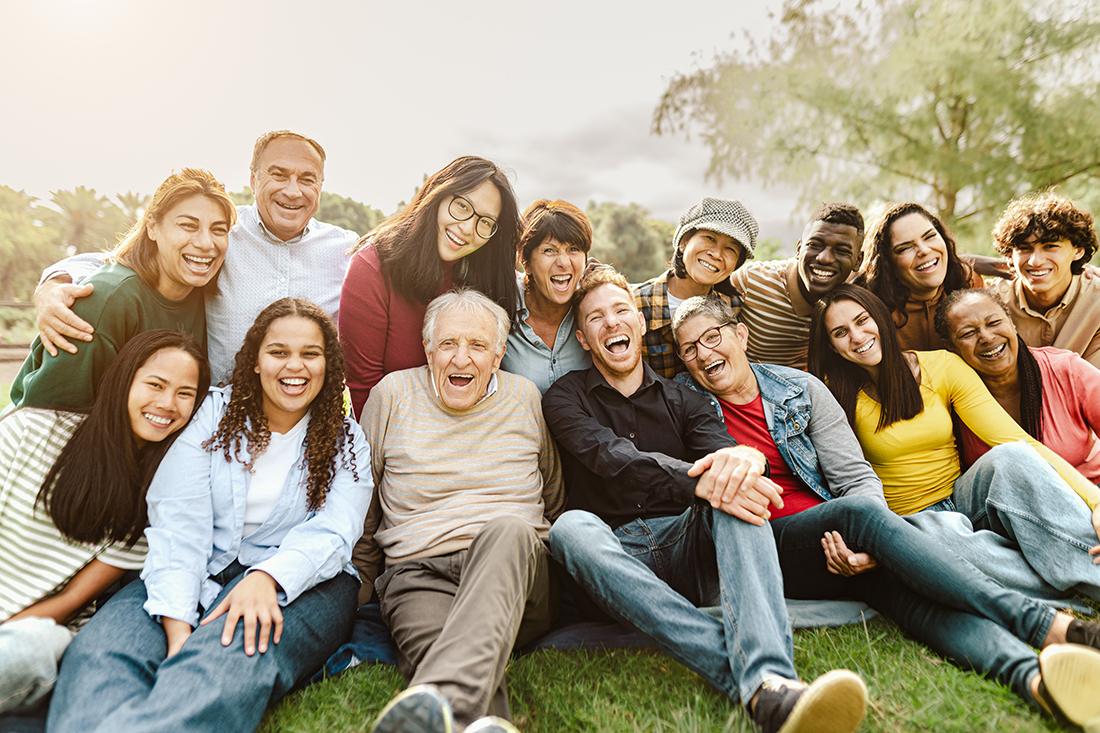There can be incredible power in intergenerational friendships. If you’ve ever had the privilege of hanging out with those from older generations, you can appreciate the wisdom, humor and life perspectives that enrich our lives in unexpected ways. Whether it’s a shared story from decades past or a simple life lesson passed down over coffee, these intergenerational connections foster growth, understanding and joy for everyone involved.
Age gaps in friendships can offer so many benefits. Doing life with older friends can enhance emotional well-being and cognitive function. Spending quality time with older adults can also boost empathy, patience and communication skills—traits that are valuable across all areas of life. Age-difference friendships help break down generational barriers, encouraging mutual respect and understanding.
And—the benefits can go both ways. When older adults spend time with younger friends, some studies suggest that these diverse friendship groups can improve physical and mental health. Some even report feeling more satisfied with the aging process. Let’s explore some of the key benefits of these unique friendships.
Lessons In Integrity From Intergenerational Friendships
The value of friendship isn’t determined by age, and age differences in friendships can have unique benefits. One of the greatest benefits of age-gap friendships is the chance to learn from others’ strong sense of integrity and authenticity. Older adults often carry a lifetime of experiences shaped by resilience, hard work and perseverance. Their stories of overcoming adversity can provide valuable insights into how to live with honesty and uphold strong moral values.
Fun fact: Intergenerational friendships may be more common than you might think. According to an AARP survey, 4 out of 10 adults (37%) have a friend 15 years older or younger than themselves.
Age-Gap Friendships Can Help Us Stay True To Ourselves
How about Judy, a high school English teacher, and lover of Shakespeare, feminism and unicorns when none of those were quite in vogue. Judy never downplayed her passions to seem “cool.” Not only was Judy rewarded with the respect of adults and students, she was free of the angst that comes from trying to be what you’re not.
Meeting a friend like Judy could help you stay true to yourself. Judy might love learning new things and sharing her experiences with a younger person who shares her interests.
Older Friends Can Teach Us To Be Courageous Examples
Courage doesn’t have an age limit. Consider the tale of a grandmother who started her own business at a time when female entrepreneurs were rare. Her dedication to her craft and refusal to compromise her principles can inspire younger generations to lead with authenticity and courage.
Another example is an elderly war veteran whose unwavering moral compass helped guide others through challenging times. These stories remind us of the enduring importance of integrity in shaping character and making principled decisions—even when faced with difficulties.
Older Generations Inspire Responsibility And Accountability
Integrity lessons from older generations also encourage responsibility and accountability. Many elders share anecdotes that highlight the value of keeping one’s word, being honest and leading with compassion. These lessons often serve as guiding principles for younger individuals navigating personal and professional challenges.
Cross-Age Friendships Can Foster Empathy And Understanding
On the flip side, older friends can benefit from the recent knowledge and perspectives of their younger friends as well. For example, an older friend may have been brought up with gender-specific expectations, lack of emotional regulation and the mantra that kids should be “seen and not heard.” Younger generations are more apt to know and use empathetic conversation models. They have a different concept of gender and an openness and appreciation for differences and beliefs that weren’t as prevalent in generations past.
Discovering Gratitude Through Time With Older Friends
Another joy of spending time with older generations is discovering the power of gratitude. Many elders possess a deep appreciation for life’s simple pleasures, from a walk in nature to a shared meal with loved ones. Their gratitude often stems from a lifetime of experiences. These may have been both joyful and challenging—and taught them to cherish what truly matters.
Making The Most Out Of Ordinary Moments
Take the example of Ruth, a widow in her early 80s, living 1,400 miles from her nearest family. It couldn’t have been an easy life, but she seemed to relish every minute of her day. “Devil get behind me!” she would crow in her Oklahoma twang, serving bowls of tapioca pudding and enthusiastic recaps of errands she had run. She was purposely doling out Jedi secrets: how to be thankful for and make the most of ordinary moments.
Embracing Simple Joys
Or consider the retired teacher who reflects on her decades spent shaping young minds. Her gratitude for simple joys—like witnessing a student’s breakthrough or sharing a laugh with a colleague—can encourage younger individuals to appreciate their own daily victories. These moments of shared reflection are sometimes found uniquely in intergenerational friendships. They can foster deeper connections and reinforce the importance of gratitude in everyday life.
Learning To Pause And Appreciate The Present
Engaging with elders can remind younger generations to pause and appreciate the present moment. A conversation with an older friend about family traditions or childhood memories can inspire a renewed sense of thankfulness for life’s small, meaningful moments.
Research suggests that practicing gratitude improves mental health, reduces stress and increases happiness. Cultivating age-gap friendships often naturally encourages gratitude by highlighting the beauty of shared experiences, family bonds and life’s fleeting moments.
Curiosity And Growth: Lifelong Lessons Found In Age-Gap Friendships
Age gaps in friendships can also foster curiosity and personal growth. Elders often have a wealth of knowledge and stories that spark curiosity. This might encourage younger individuals to ask questions, explore new ideas and think deeply.
And the road goes both ways—younger counterparts have information and ideas they can share with their more mature friends too.
Cross-Age Friendships Can Give A New Take On History
Learning about historical events from someone who lived through them offers a personal connection to history that textbooks can’t replicate. These interactions in intergenerational friendships can inspire lifelong learning and a desire to see the world through different lenses.
Older Friends Can Inspire Us To Pave Our Own Paths
Consider the brilliantly funny poet, who right until the stroke that led to her death at 93, stayed up far into the night, every night, writing. Never mind other people’s belief that the old should be early birds. Her quirky hours worked for her, and she stuck with them—inadvertently shoring up a resolve to keep the habits that were right for her.
In an age-gap friendship, this can inspire us to get past stereotypes or others’ expectations or assumptions. Instead, we can choose habits, routines, passions and lifestyles that work for us.
Age-Difference Friendships Help Us See The Power Of Staying Surious
Older generations also often demonstrate the value of staying curious and engaged, even in later stages of life. Many retirees take up new hobbies, pursue creative passions or engage in community activities. In an age-gap friendship, observing or joining in on their zest for life can inspire younger individuals to embrace continuous learning and personal development.
John, a retired writing professor, is a prolific nonfiction author still exploring new subjects in his 80s. It would be hard to miss the link between his vitality and his bottomless fascination with the world. Ditto for Judy, who began studying the piano in her 70s. And let’s not forget Lucille. At an age when many people would be content to sit and watch the Weather Channel, she took up playwriting. It is not just any kind of playwriting either: historical playwriting, which requires both creativity and tons of research. While hanging out with friends, her unspoken motto seemed to be: Live as if you have all the time in the world—but also as if each day is your last.
These stories emphasize that growth doesn’t stop with age—it evolves and flourishes when nurtured by curiosity and determination. Whether it’s a five-, 10-, 15-year or greater age gap, intergenerational friendships can cultivate growth between both people.
The Benefits Of Hanging Out With Older Generations
The benefits of having cross-age friendships can impact many areas of our lives.
Connections To Better Mental And Physical Health
It’s no secret that community and relationships are important for our well-being. Harvard Health suggests that intergenerational friendships offer numerous benefits for both younger and older individuals. Henry Ford Health also suggests that spending time with elders can improve mental health, reduce feelings of loneliness and promote a greater sense of purpose.
Mutual Benefits And Support
For younger people, these friendships provide valuable mentorship and life guidance. Older adults, on the other hand, benefit from increased social interaction and a sense of connection to younger generations. A 2023 study found that older adults who regularly interact with young people report higher levels of happiness and life satisfaction.
Breaking Down Stereotypes And Building Bridges
Intergenerational friendships also combat ageism by fostering empathy and breaking down stereotypes. When people from different generations connect, they gain a deeper appreciation for each other’s experiences. This can bridge generational divides and promote mutual respect.
Powerful Exchange Of Skills And Knowledge
Additionally, age-difference relationships encourage the exchange of skills and knowledge. While elders share life wisdom and historical insights, younger individuals can offer technological know-how or other knowledge. This can create a mutually beneficial relationship that fosters learning and growth on both sides. The benefits of having older friends extend beyond companionship—they provide opportunities for learning, growth and shared joy.
How To Build Age-Gap Friendships
At the end of the day, age really is just a number. Connecting based on mutual interests, personalities, shared work interests or any number of commonalities can spark a friendship with someone of any age.
Creating meaningful relationships with older adults, just like any friendship, requires intention and effort. Here are some practical ways to build these connections:
- Find shared interests: Discover hobbies or passions you both enjoy, such as gardening, cooking or reading.
- Listen actively: Show genuine interest in their stories and experiences.
- Plan regular meetups: Consistency helps strengthen bonds over time.
- Offer mutual support: Share your skills while learning from theirs—whether it’s teaching them new technology or learning traditional recipes from them.
- Join community programs: Volunteer at senior centers or participate in intergenerational initiatives to create organic opportunities for connection.
- Respect one another: Generational differences are real, so it’s important to have mutual respect. The parenting or cultural norms from years past may be very different from those of today.
- Give your connection time: Just like any relationship, age-gap friendships may not develop overnight. Give your connection time to develop.
- Let go of expectations: Sometimes we can get caught up in concepts of what a friendship “should” or “shouldn’t” look like. It’s OK for your intergenerational friendship to be unique and not look like anyone else’s.
Establishing these relationships can be incredibly fulfilling, offering insights, emotional support and companionship. By investing time and effort into fostering these bonds, you’ll create meaningful experiences that enrich both of your lives.
Embracing The Joy Of Intergenerational Friendships
The pleasure of hanging out with older generations is rich and multifaceted. Here are some of the most meaningful takeaways:
- Integrity: Older generations often exemplify authenticity, resilience and strong moral values. Their stories inspire us to lead with honesty and uphold our principles.
- Gratitude: Spending time with elders teaches us to appreciate life’s simple pleasures and cultivate thankfulness for everyday moments.
- Curiosity and growth: Elders show us the value of lifelong learning, encouraging curiosity and a commitment to personal development at any age.
- Mutual understanding, support and connection: The benefits of intergenerational friendships go both ways. Spending time connecting can be fun and meaningful and can improve both physical and mental well-being.
Fostering these age-gap friendships can enrich our lives with wisdom, new perspectives and joy. Embracing intergenerational friendships brings unique benefits and can help us create meaningful connections, learn new things and so much more. There’s no price or age limit on friendship. Consider getting out and making a new friend today, regardless of their age.
FAQs About Age-Gap Friendships
Why foster intergenerational friendships?
Spending time with older people often brings joy because of their wisdom, life stories and calming presence. Their experiences can offer fresh perspectives and valuable lessons, enriching personal growth.
Where should we visit?
Where you visit will primarily depend on your mutual interests, physical abilities and preferences. Unless there are health concerns or a friend is in a hospital or assisted living facility, you are free to visit anywhere you choose.
Where can I meet those interested in intergenerational friendships?
Older adults often gather at community centers, libraries, parks, cafés and places of worship. These spaces provide opportunities for social interaction and engagement with others, fostering a sense of belonging and community.
What if I have trouble naturally making friends with older adults?
Programs like senior companionship initiatives pair volunteers with elders to foster meaningful social interactions and alleviate feelings of loneliness. Since many older adults are retired and engage in volunteer work, volunteering can be another good opportunity to make friends with people of different ages.
What are the benefits of intergenerational friendships for older adults?
Socializing can help prevent loneliness and depression, enhance cognitive function and improve overall well-being for older adults. It also encourages a sense of purpose and belonging, which can lead to improved physical health and increased longevity.
This article was updated March 2025. Photo by Alessandro Biascioli/iStock.







